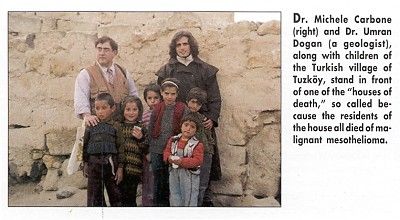Turkish Towns Provide Genetic Link to Malignant Mesothelioma
CHICAGO-An analysis of a six-generation extended pedigree of 526 people from two small Turkish villages showed that mesothelioma is genetically transmitted, and that building materials containing erionite may be a cofactor.
CHICAGOAn analysis of a six-generation extended pedigree of 526 people from two small Turkish villages showed that mesothelioma is genetically transmitted, and that building materials containing erionite may be a cofactor.
The pedigree analysis of individuals from Karain (population about 600) and Tuzköy (1,400) suggests that mesothelioma is probably transmitted in an autosomal dominant way, Michele Carbone, MD, reported at a conference on malignant mesothelioma hosted by the University of Chicago. [Look for more reports from this meeting next month, including a consensus statement on the role of SV40 in the disease.]
In the villages of Karain and Tuzköy, malignant mesothelioma causes more than 50% of deaths, yet surrounding villages appear unaffected by mesothelioma. This finding prompted researchers to look for the causative agent, asbestos, in the two villages.
Investigators thought they had isolated the causative agent, but subsequently discovered that asbestos was a natural component of the volcanic terrain of this Cappadocian region. Since asbestos was found nearly everywhere in the region, it could not account for the uniquely high incidence of mesotheliomas in these two villages.
Further research implicated erionite, a mineral fiber that had been detected in the lungs of several villagers. In addition, erionite was found to cause mesothelioma tumors in rodents. However, erionite, like asbestos, was also found to be common throughout most villages of this region and thus, by itself, could not account for the high incidence of mesothelioma deaths.
Dr. Carbone, associate professor of pathology, Loyola University Medical Center, Maywood, Illinois, noted that malignant mesothelioma occurred mostly in specific homes where entire families had died from the disease. Residents of the villages referred to these as "the houses of death."

On one visit to Karain, Dr. Carbone observed these houses first-hand (see Figure). As he left one such house, a child immediately began brushing a white powder, presumably containing erionite, from his jacket where it had rubbed against the stone wall of the house.
Local authorities told Dr. Carbone that these "houses of death" contained a greater amount of the causative agent, erionite, even though neighboring houses appeared to have been built at about the same time with what appeared to be the same type of stones.
Subsequent research confirmed the widespread use of erionite-containing stones throughout other Turkish villages in the region, with and without a high incidence of malignant mesothelioma deaths, thus ruling out erionite as the sole causative agent.
Dr. Carbone began investigating the genetic evidence in Turkish villages. Similar familial clusters of mesotheliomas had already been observed in certain Western families, supporting a comparable hypothesis that genetic transmission caused a predisposition in Western countries to asbestos or SV40 carcinogenesis.
Gathering Genetic Data
To study the genetic hypothesis, one investigator from Dr. Carbone’s research team, Iman Roushdy-Hammady, a PhD candidate in medical anthropology, spent 2 years living in these Turkish villages, and several months living in Sweden and Germany to study emigrants who originated from these villages. Mr. Roushdy-Hammady was able to pierce substantial cultural barriers to gathering epidemiologic and genetic data, which were then analyzed by Dr. Carbone’s research team.
Dr. Carbone said that six families were identified in which mesothelioma showed obvious familial clustering. The six families were linked to one large six-generation extended pedigree of 526 individuals. Among these individuals, Dr. Carbone identified 22 affected nuclear families with 87 children of affected parents41 of these 87 children had developed malignant mesothelioma as adults.
The number of children with mesothelioma, 41 cases, did not differ significantly from the number of cases that would have been predicted from an autosomal dominant pattern of inheritance: 43.5 children (P = .5). This finding suggests that malignant mesothelioma segregates in an autosomal dominant pattern and that erionite might be a cofactor in genetically predisposed individuals, Dr. Carbone said. He hopes that further information will allow linkage analysis to identify those genetic-susceptibility factor(s) that predispose individuals to malignant mesothelioma in Cappadocian villages. "It is possible that the same gene that is genetically mutated in Cappadocia may be the target of asbestos and SV40 carcinogenesis [the causes of mesothelioma seen in developed countries]," he said. Isolation of this putative gene may pave the way to understanding molecular pathogenesis of the disease.